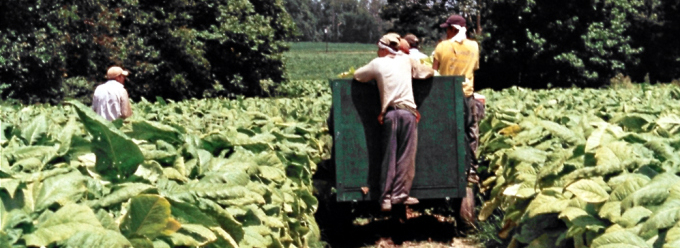The Moral Urgency of Farmworkers in the Media
 Tuesday, May 27, 2014 at 11:35AM by
Tuesday, May 27, 2014 at 11:35AM by  Editor
Editor

Spring and summer herald the annual return of migrant workers to farms around the country, especially in North Carolina. So often, workers’ return to our home state means their resuming hard work for little pay, the constant risk of pesticide exposure, and, for their children, going to work in a dangerous environment. While workers’ situation in our economy remains dire, this spring is beginning differently in at least one respect: gradually, the media has begun to turn its attention to child labor issues and the pesticide exposure migrant farmworkers face.
CNN recounts the story of Jessica Rodriguez, who began working in tobacco fields in North Carolina at age 11. While she should have been in school, Jessica worked in the fields, encountering dehydration and green tobacco sickness, a potentially lethal illness related to tobacco exposure. Even worse, according to an alarming new Human Rights Watch (HRW) report, more than half of children in Jessica’s situation experience pesticides being applied to crops by growers as they continue to work in the fields.
Meanwhile, The Guardian picked up the story of Eddie Ramirez, who began work in the fields at age 12. Part of the tragedy of child labor in North Carolina is that children like Eddie and Jessica being forced to work is legal. Laws designed to allow children to work on family farms have become loopholes that allow underprotected migrant youth to be exposed to dangerous industrial agricultural environments. The U.S. now lags behind Brazil and India in the legal protections it offers children, according to the HRW report.
The groundswell of media attention in the days since the HRW report was released is a welcome development in the fight against child labor and injustice against migrant farmworkers. Dozens of media outlets from California to Connecticut have picked up the story of the fight for human dignity being waged in North Carolina and around the country, including an op-ed in the New York Times.
For the tide to turn, however, and for farmworkers’ dignity to be acknowledged, we cannot be satisfied with merely reading about issues in the news. The time to act is now.
FAN is dedicated to fighting for workers’ dignity and committed to seeing injustice eradicated, but we are counting on your support. Your help is needed at this pivotal time:
-
SIGN Human Rights Watch’s petition to end child labor in tobacco farming.
-
SUPPORT FAN-member organization Toxic Free NC’s petition pertaining to proposed changes in the EPA’s Worker Protection Standard (WPS). Toxic Free’s petition calls for tightening rules concerning children being exposed to pesticides in the fields.
-
COMMENT on the EPA’s proposed WPS changes. For more information, and to see FAN’s statement on the changes, visit the FAN blog.
-
WRITE a letter to the editor or Op-Ed for your local newspaper bringing the plight of farmworkers to your paper’s attention. For resources, sample letters, and more, contact FAN.
-
WATCH FAN’s Emmy-award winning documentary HARVEST OF DIGNITY, or contact FAN to host a screening.
-
LIKE FAN on Facebook, follow us on Twitter, Pin Harvest of Dignity, and tell your friends that you stand with farmworkers this summer.










